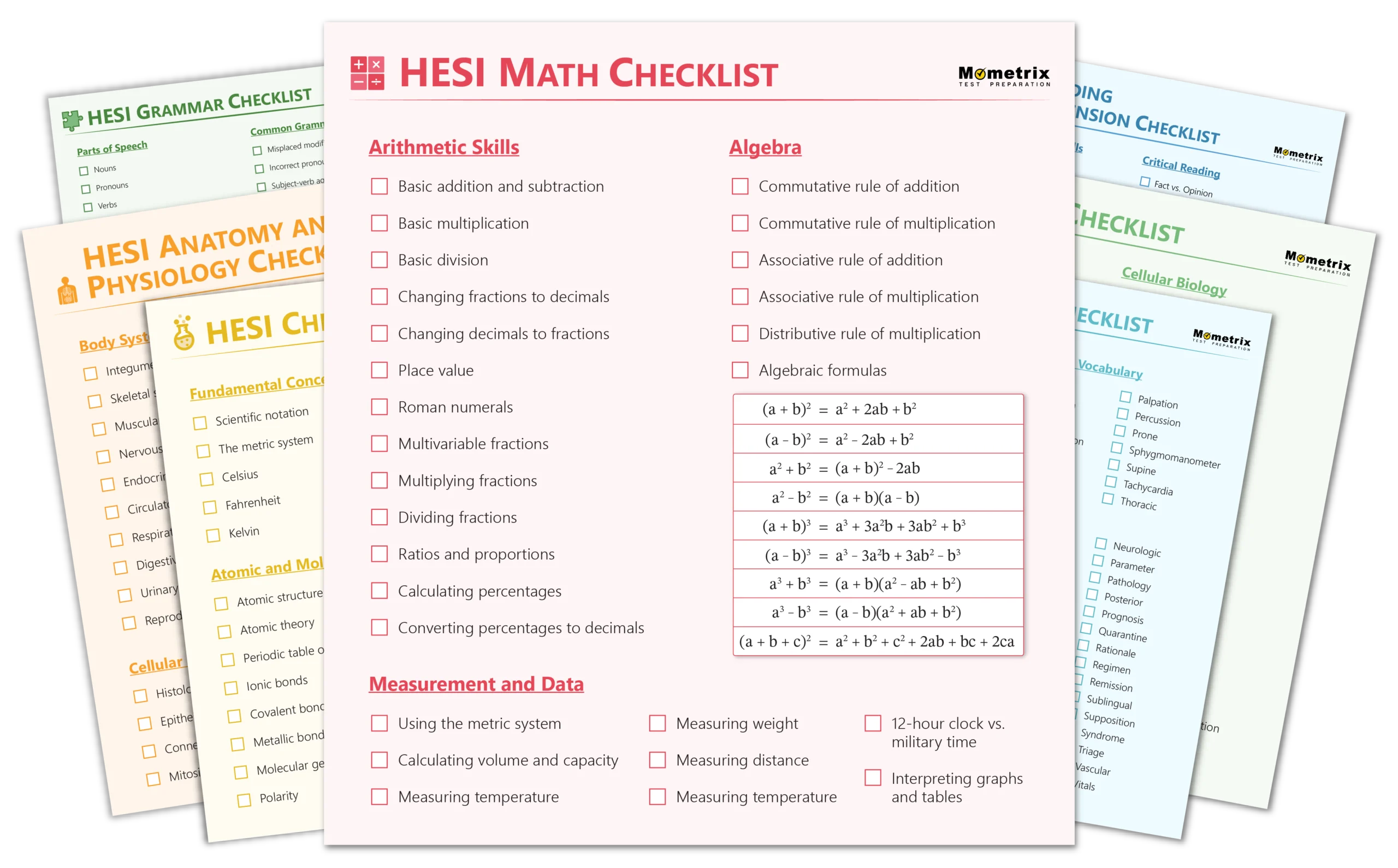Welcome to the HESI A2 practice test page!
Click the “Start Test” button at the top of this page to begin our free HESI practice test! These HESI practice questions will give you a better idea of what to study for your exam.
Continue reading to find out more about the HESI exam, and click below for more test prep resources.
HESI A2 Checklists
Knowing exactly what to spend your time studying isn’t always easy. To help you study effectively and efficiently, we’ve compiled a free checklist that breaks down the essential topics you need to cover for each section of the exam, making it easy to track your progress!
Click below to start keeping track of your progress and focusing your studying on the topics that really matter.
HESI Practice Tests by Subject
If you need some extra practice in a specific subject, click one of the subjects below to get started on a subject-specific HESI practice test.
Good luck with your studying!

HESI A2 Outline
The HESI A2 exam contains seven subtests, which are outlined below.
It’s important to note that you will most likely not be required to take every subtest on this list.
Depending on your program, you may only need to take the Mathematics, Reading Comprehension, Vocabulary, and Grammar subtests. Some schools may ask you to take the Biology and Anatomy & Physiology subtests as well, but the Chemistry subtest is rarely ever required. Check with the administrators of the school you are applying to for more information.
Registration
In most cases, the nursing school or program you’re applying to will handle the actual administration of the HESI exam. It will be up to them to determine which of the various sub-tests you’ll take, what the time limits for the various tests are, and where you’ll take the exam. They’ll also determine the fees you’ll pay to take the HESI A2. In many cases, you’ll take the test right on the college campus.
All of this information should be available on the nursing program’s website. If it isn’t, call or email the nursing department of the school to get the information.
Scores
There are no official passing scores or failing scores on the HESI exam. Each nursing school or program sets its own standards for ranking scores on each subtest. Generally speaking, though, any score below 75% is considered to be an indication that the applicant is not academically ready for the challenges of nursing school in that area.
A score in the range of 75% to 79% is considered to be in the bottom range of acceptable, but an applicant whose score falls in this range will probably need quite a bit of help to succeed in nursing school. Scores from 80% to 89% indicate that the applicant should be able to graduate from nursing school with only minimal academic assistance. A score of 90% or higher is a sign that the test taker is very likely to do well in nursing school without any academic assistance.
HESI Score Requirements
To give you an idea of how varied the score requirements can be from school to school, here are a few examples of the HESI A2 score requirements from different schools across the country:
| College/University | HESI A2 Score Requirements | |
|---|---|---|
 | University of Arizona College of Nursing | 75% (cumulative) |
 | Baylor University | 80% (cumulative) |
 | Southern Arkansas University | 75% (cumulative) |
 | University of North Georgia | 75% (cumulative) |
 | Central New Mexico Community College | 75% (cumulative) |
 | Lake Michigan College | 75% on each subject |
 | New Mexico State University | 75% on each subject |
 | West Coast University | 76% (cumulative) |
 | Norfolk State University | 75% (cumulative) |
 | LSU Health New Orleans | 80% (cumulative) |
 | Texas Southmost College | 75%-80% (program‑dependent) |
Retaking the HESI Exam
This is another matter that is up to each school to decide for itself. Most schools allow at least one re-take if a person isn’t satisfied with their score. However, there is often a waiting period that must be satisfied before attempting the exam again. Some schools allow more than one retake, but only so many within a calendar period. Ideally, you’ll do your very best on your first attempt and won’t need to worry about retaking the HESI.
Taking HESI Practice Tests
Smart Study Strategies
Your success on the HESI depends on how you study, not just how much.
Regularly checking your progress is important, and HESI A2 practice tests are a fantastic way to do this. Practice tests are useful because they show exactly where you need to improve.
Every time you take a free HESI practice test, pay close attention to these three types of questions:
- ❌ The questions you answered incorrectly
- 🤔 The questions you guessed on (even if you happened to guess correctly)
- ⌛ The questions that felt challenging or took you a long time to answer
For each question, ask yourself why it was difficult. Did you not fully grasp the underlying concept? Do you need more practice with similar questions to improve your speed and build confidence? Are you having trouble with the vocabulary? Use these questions to figure out how to strengthen those knowledge gaps as you revisit the material.
Understanding the “Why”
Many HESI practice tests offer a quick explanation for each correct answer. While reading these can be helpful, remember that they usually only touch on a portion of the broader context. Even if an explanation seems to make sense, explore all related concepts until you’re confident you have a complete understanding.
Comprehension, Not Memorization
Remember, practice tests are just that—practice. These questions won’t be on the actual test, so memorizing them won’t do you much good.
If you only know the right answers to the sample questions, you won’t be prepared for the real thing. Instead, focus on studying the underlying concepts until you truly understand them. This will help you tackle any question the real test throws your way.
Top 5 Most Challenging HESI Questions
Now that you know how to approach practice tests, try your hand at some targeted practice on your own!
Over the last 8 months, we’ve compiled the data from nearly 10,000 test-takers who tried their hand at the practice test at the top of this page. According to the data, around 70%-80% of people answered these five questions incorrectly.
Answer each question and read through the answer explanation, whether you got the answer right or wrong. This will help you ensure you’ve got the topic mastered.
Whether you struggled with these questions or aced them on your first try, be sure to take the full practice test to get a better idea of how prepared you really are!
1. Select the word or phrase that makes the following sentence grammatically correct:
My cousin, Janet, and ____________ are planning to join us at the opera this weekend.
2. Select the word or phrase that makes the following sentence grammatically correct:
The new benefit plan applies to ____________ employees in the agency.
3. Which of the following statements regarding chemiosmosis in mitochondria is NOT correct?
4. Select the combination of words that makes the following sentence grammatically correct.
Because Edwina had ___________ time than she expected, she ran to the express lane in the grocery store, despite the fact that she had more than the required "Ten Items or ___________."
Check Out Mometrix's HESI A2 Study Guide
Get practice questions, video tutorials, and detailed study lessons
Get Your Study Guide
Practice Strategies
When you’re ready to start taking practice tests, follow this strategy:
- Remove Limitations. Take the first test with no time constraints and with your notes and HESI study guide handy. Take your time and focus on applying the strategies you’ve learned.
- Time Yourself. Take the second practice test “open book” as well, but set a timer and practice pacing yourself to finish in time.
- Simulate Test Day. Take any other practice tests as if it were test day. Set a timer and put away your study materials. Sit at a table or desk in a quiet room, imagine yourself at the testing center, and answer questions as quickly and accurately as possible.
- Keep Practicing. Keep taking practice tests on a regular basis until you run out of practice tests or it’s time for the actual test. Your mind will be ready for the schedule and stress of test day, and you’ll be able to focus on recalling the material you’ve learned.
If you need additional instruction, check out the Mometrix flashcards and study guide which includes additional practice tests. These invaluable resources include a risk-free, 1-year 100% money-back guarantee. Repetition and practice are key to adequate preparation.
HESI A2 Online Prep Course
If you want to be fully prepared, Mometrix offers an online HESI prep course designed to give you everything you need to succeed!
Here’s what you’ll find in the HESI A2 course:
Everyone learns differently, so we’ve tailored the HESI online prep course to ensure every learner has what they need to prepare for the HESI exam.
Click below to check it out!
HESI vs. TEAS
The HESI A2 and the TEAS 7 are both entrance exams for nursing school. Wondering which exam is right for you?
Take a look at the details of each exam here:
| HESI A2 | TEAS | |
|---|---|---|
| Time | 4 hours (estimate varies based on sections) | 3 hours and 29 minutes |
| Question Count | 326 questions (estimate varies by institution and sections selected) | 170 questions |
| Sections | Up to 9 | 4 |
| Subjects |
|
|
| Test Dates | Scheduled by individual schools or testing centers | Available year-round through testing centers or remote proctoring |
| Registration | Online | Online or at participating institutions |
| Fee | $40–$100 (estimate varies by institution) | $115–$140 (estimate depends on testing format and location) |
| Fee Waiver | Varies by institution | No |
| Receive Score | Immediate for most sections; writing sections may take a few days. | Immediate unofficial scores for computer-based; official scores in 48 hours. |
| Option to Retake | Determined by individual schools (often 2–3 attempts per year) | Allowed every 30 days; typically 2–3 attempts per year (varies by institution) |
| Pass or Fail | No (passing score varies by institution) | No (passing score varies by program) |
| Time | |
|---|---|
| HESI A2 | TEAS |
| 4 hours (estimate varies based on sections) | 3 hours and 29 minutes |
| Question Count | |
|---|---|
| HESI A2 | TEAS |
| 326 questions (estimate varies by institution and sections selected) | 170 questions |
| Sections | |
|---|---|
| HESI A2 | TEAS |
| Up to 9 | 4 |
| Subjects | |
|---|---|
| HESI A2 | TEAS |
|
|
| Test Dates | |
|---|---|
| HESI A2 | TEAS |
| Scheduled by individual schools or testing centers | Available year-round through testing centers or remote proctoring |
| Registration | |
|---|---|
| HESI A2 | TEAS |
| Online | Online or at participating institutions |
| Fee | |
|---|---|
| HESI A2 | TEAS |
| $40–$100 (estimate varies by institution) | $115–$140 (estimate depends on testing format and location) |
| Fee Waiver | |
|---|---|
| HESI A2 | TEAS |
| Varies by institution | No |
| Receive Score | |
|---|---|
| HESI A2 | TEAS |
| Immediate for most sections; writing sections may take a few days. | Immediate unofficial scores for computer-based; official scores in 48 hours. |
| Option to Retake | |
|---|---|
| HESI A2 | TEAS |
| Determined by individual schools (often 2–3 attempts per year) | Allowed every 30 days; typically 2–3 attempts per year (varies by institution) |
| Pass or Fail | |
|---|---|
| HESI A2 | TEAS |
| No (passing score varies by institution) | No (passing score varies by program) |
Check Out Mometrix's HESI A2 Flashcards
Get complex subjects broken down into easily understandable concepts
Get Your Flashcards
FAQs
Q
Are the NCLEX and HESI the same?
A
No, these are two different exams with two different purposes. The HESI A2 evaluates your academic readiness for nursing school and is often used to predict how well you will do on the NCLEX. The NCLEX is what you take to become a licensed nurse once you graduate nursing school.
Q
Who makes HESI?
A
The HESI exams are designed by Elsevier.
Q
What is the HESI exam?
A
The HESI exam is an entrance exam for nursing school. It’s goal is to test your knowledge in various academic areas as a predictor for how well you will do in nursing school.
Q
Is the HESI exam hard?
A
Yes, the HESI is generally considered to be a difficult test. How well you do depends on your own college readiness and how much studying you do beforehand.
Q
How long is the HESI exam?
A
The length of the exam changes from school to school, depending on their requirements. It could last anywhere from 2 to 6 hours.
Q
How many questions are on the HESI A2?
A
The number of questions depends on how many subject areas you’re tested on. Generally, the full test contains about 250-300 questions.
Q
What does HESI stand for?
A
HESI stands for Health Education Systems, Inc.
Q
What is the HESI Exit exam?
A
The HESI Exit exam is what you take in order to predict your success on the NCLEX exam.
Q
Can you use a calculator on the HESI?
A
You are allowed to use a calculator on the HESI exam. However, you cannot bring your own. There will be a digital calculator available on-screen.
HESI is a registered trademark of Elsevier Inc., which was not involved in the production of and does not endorse this content.




